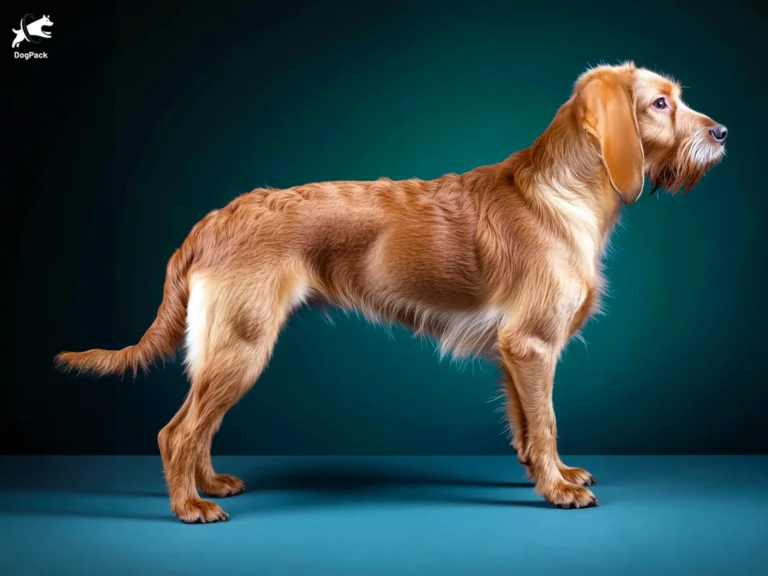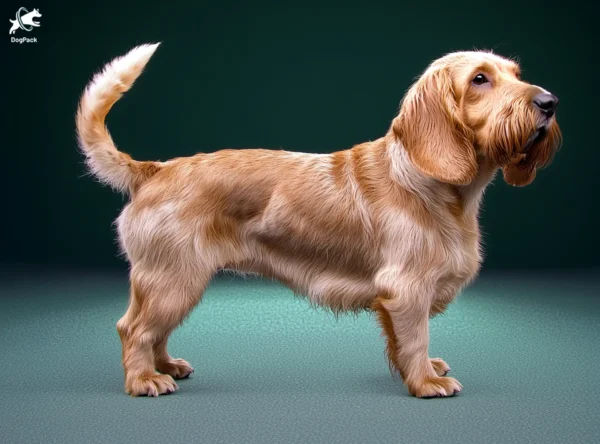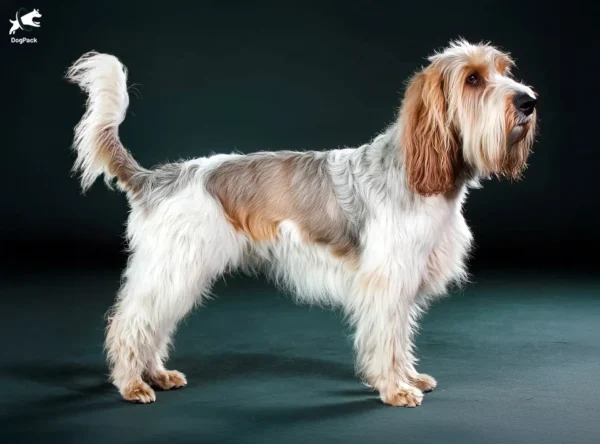Griffon fauve de bretagne Dog Breed Info & Overview
The Griffon Fauve de Bretagne, also known as the Fawn Brittany Griffon, is a spirited and affectionate hound breed originating from France. Renowned for its warm fawn-colored coat and lively personality, this rare breed was historically used for hunting wild boar. Today, they make wonderful family companions, blending energy with a friendly demeanor.
Characteristics
Pictures
Breed History
The Griffon Fauve de Bretagne has a rich history dating back to medieval France. Originally bred in the Brittany region, these dogs were prized by nobility for their exceptional hunting skills, particularly in tracking wild boar and wolves. Their keen sense of smell and relentless drive made them indispensable companions in the hunt.
After the French Revolution, the breed’s numbers declined significantly due to changes in hunting practices and societal shifts. By the early 20th century, the Griffon Fauve de Bretagne was nearly extinct. Dedicated breeders and enthusiasts worked tirelessly to revive the breed, focusing on preserving its unique characteristics and hunting prowess.
Today, this breed is still relatively rare outside of France but has gained recognition among hound enthusiasts worldwide. It continues to be used for hunting in its homeland while also thriving as a loyal and affectionate family pet. Its revival is a testament to the dedication of its supporters.
Temperament, Personality
The Griffon Fauve de Bretagne is known for its friendly and outgoing nature. They form strong bonds with their families and are especially affectionate with children. Their playful demeanor and high energy levels make them excellent companions for active households.
While they are sociable dogs, they can be somewhat independent due to their hunting background. Early socialization is important to ensure they interact well with other pets and strangers. Their keen sense of smell might lead them to follow scents, so secure yards are a must.
These dogs are intelligent and eager to please but may exhibit a stubborn streak at times. Patience and positive reinforcement go a long way in training. Overall, their loving personality makes them a joy to have around.
Physical Characteristics
The Griffon Fauve de Bretagne is a medium-sized dog with a distinctive rough, wiry coat that comes in shades of fawn. Their coat provides protection against harsh weather and rough terrain, a testament to their hunting origins. They have a sturdy build, with muscular legs built for endurance.
Their expressive eyes are usually dark brown, exuding warmth and intelligence. Long, drooping ears frame their face, enhancing their keen sense of hearing. A strong, straight tail often carried high adds to their alert and energetic appearance.
One of the breed’s most notable features is its beard and mustache, giving them a charmingly rugged look. Despite their rustic appearance, they carry themselves with grace and agility, ready to spring into action when needed.
Health Issues
Overall, the Griffon Fauve de Bretagne is a hardy breed with relatively few genetic health problems. However, like all breeds, they can be prone to certain conditions. Hip dysplasia is one concern, especially in active dogs, so regular veterinary check-ups are important.
Ear infections can occur due to their drooping ears, which can trap moisture and debris. Regular ear cleaning can help prevent infections. Additionally, as deep-chested dogs, they may be at risk for bloat, a serious condition requiring immediate attention.
Maintaining a balanced diet and appropriate exercise routine can contribute to their overall health and longevity. Routine health screenings and staying up-to-date with vaccinations will ensure your Griffon Fauve de Bretagne stays in top shape.
Grooming Needs
The Griffon Fauve de Bretagne’s wiry coat is relatively low-maintenance but does require regular brushing to prevent matting. A thorough brushing once or twice a week will keep their coat healthy and clean. Their coat naturally repels dirt, which is a plus for active dogs.
Bathing should be done occasionally, as over-bathing can strip the coat of its natural oils. When necessary, use a gentle dog shampoo suitable for wiry coats. Hand-stripping may be required a couple of times a year to remove dead hair and maintain the coat’s texture.
Don’t forget about dental hygiene—regular teeth brushing helps prevent tartar buildup and bad breath. Nails should be trimmed monthly, and ears checked weekly for signs of infection. Overall, grooming is moderate and can be managed with routine care.
Exercise Requirements
Being a high-energy breed, the Griffon Fauve de Bretagne requires ample daily exercise. Long walks, jogs, or vigorous play sessions are essential to keep them physically and mentally stimulated. Without sufficient exercise, they may become bored and develop unwanted behaviors.
Engaging in activities that tap into their hunting instincts, like scent work or tracking games, can be particularly rewarding. They excel in dog sports such as agility and obedience trials, which also strengthen the bond between dog and owner.
A secure, spacious yard is ideal for them to roam and explore. However, always supervise outdoor time, as their keen nose might lead them to wander off in pursuit of an interesting scent. Regular exercise contributes to their overall happiness and well-being.
Training Tips
The Griffon Fauve de Bretagne is intelligent but can be somewhat independent, making training a mix of challenges and rewards. Consistency and positive reinforcement techniques work best. They respond well to praise, treats, and playtime as rewards for good behavior.
Early socialization is crucial to help them become well-rounded adults. Exposing them to different environments, people, and other animals reduces the likelihood of shyness or aggression. Patience is key, as pushing too hard may lead to stubbornness.
Given their hunting background, they may have a strong prey drive. Training recall commands thoroughly is important to ensure they return when called. Enrolling in obedience classes can provide structure and help address any specific training needs.
Nutrition, Diet
A balanced diet is essential for the Griffon Fauve de Bretagne to maintain optimal health and energy levels. High-quality dog food formulated for active breeds suits their nutritional needs. Protein-rich diets support muscle development and overall vitality.
Portion control is important to prevent obesity, which can strain their joints and lead to health issues. Typically, splitting their daily food intake into two meals helps with digestion and energy distribution. Always adjust portions based on activity level, age, and veterinary advice.
Some Griffon Fauve de Bretagne may have sensitivities to certain ingredients, so monitor for any signs of food allergies like itching or digestive upset. Fresh water should always be available, especially after exercise. Consult your veterinarian for personalized dietary recommendations.
Adoption, Breeders
Finding a Griffon Fauve de Bretagne may require some effort due to their rarity outside France. Reaching out to breed-specific clubs or organizations can provide leads on reputable breeders. The Griffon Fauve de Bretagne Club is an excellent resource for information and breeder contacts.
Ensure any breeder you consider follows ethical practices, prioritizing health and temperament over profit. Visiting the breeder, meeting the parent dogs, and asking about health clearances are crucial steps. A responsible breeder will be transparent and supportive.
Adoption is another option, though Griffon Fauve de Bretagne rescues are less common. Checking with hound-specific rescue groups or shelters may yield results. Adopting an older dog can be rewarding and provides a loving home to a dog in need.
Family Pet?
The Griffon Fauve de Bretagne can make an excellent family pet for the right household. Their affectionate nature and love for companionship mean they thrive in environments where they are included in family activities. They are generally good with children, especially when raised together.
Due to their energetic disposition, they are best suited for families that can provide ample exercise and mental stimulation. Their hunting instincts may make them less compatible with smaller pets like cats or rodents unless properly socialized from a young age.
Noise levels should be considered, as they may bark or howl, especially if bored or under-exercised. Families living in rural or suburban areas may find them a better fit than those in apartments. Overall, they are loving dogs that bring joy to active households.
Right For You?
f you’re considering the Griffon Fauve de Bretagne, reflect on your lifestyle and whether it aligns with the breed’s needs. They are ideal for active individuals or families who enjoy outdoor activities and can commit to daily exercise routines.
Prospective owners should appreciate a dog with a strong hunting heritage and be prepared to manage their instincts accordingly. Patience in training and a sense of humor will go a long way in building a strong bond with them.
Those living in spacious homes with secure yards will find it easier to meet their physical needs. If you’re seeking a loyal, energetic companion who brings enthusiasm to daily life, the Griffon Fauve de Bretagne could be the perfect match.
Conclusion
Bringing a Griffon Fauve de Bretagne into your life can be a rewarding experience filled with adventure and affection. Their energetic spirit and loving nature make them wonderful companions for those who can meet their exercise and attention needs. If you’re ready for a loyal friend who will keep you active and entertained, this rare French breed might just be the perfect addition to your family.
FAQs
-
Is the Griffon Fauve de Bretagne good with other dogs?
The Griffon Fauve de Bretagne generally gets along well with other dogs, especially when socialized early. Their pack hunting background means they are accustomed to working alongside other canines, but proper introductions are still important to ensure harmony.
-
Does the Griffon Fauve de Bretagne have a strong prey drive?
Yes, the Griffon Fauve de Bretagne has a strong prey drive due to its hunting heritage. They may be inclined to chase small animals, so caution is advised when they’re around cats or wildlife. Secure fencing and leash control are recommended.
-
How much does a Griffon Fauve de Bretagne puppy cost?
A Griffon Fauve de Bretagne puppy can be quite expensive due to the breed’s rarity. Prices may range from $1,000 to $2,000 or more, depending on the breeder and lineage. Always choose a reputable breeder to ensure a healthy puppy.
-
Is the Griffon Fauve de Bretagne suitable for apartment living?
The Griffon Fauve de Bretagne is not ideal for apartment living due to its high energy levels and need for space to roam. They thrive in homes with large, secure yards and benefit from access to outdoor activities and open spaces.
-
What kind of jobs can a Griffon Fauve de Bretagne do?
Beyond hunting, the Griffon Fauve de Bretagne excels in roles that utilize its scenting abilities, such as search and rescue or tracking work. They also perform well in dog sports like agility, rally, and obedience trials, showcasing their versatility.
Breed Ratings
The Griffon Fauve de Bretagne is reasonably intelligent but can be independent-minded, requiring patience and consistency in training.
This breed loves to play and enjoys engaging in games and activities with its family, making it a fun companion.
With high energy levels, they need ample daily exercise to channel their enthusiasm and keep them content.
Shedding is moderate; regular brushing helps manage loose hair and keeps the coat in good condition.
A strong prey drive is inherent due to their hunting background; caution is needed around small animals.
Grooming requires moderate effort, including regular brushing and occasional hand-stripping to maintain the coat.
They are trainable but may exhibit stubbornness; positive reinforcement and patience yield the best results.
The Griffon Fauve de Bretagne prefers company and may experience separation anxiety if left alone too long.
Vocal by nature, they may bark or howl frequently, especially if bored or under-stimulated.
Drooling is minimal, so they are relatively tidy in this regard compared to some other breeds.
Generally friendly with other dogs, especially when well-socialized from a young age.
A generally healthy breed with few genetic issues, though regular vet care is essential for maintaining health.













